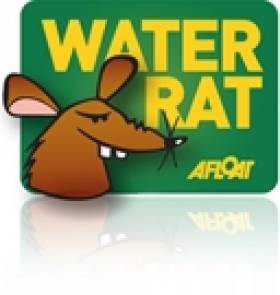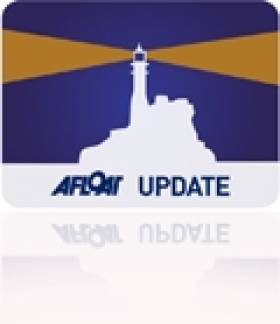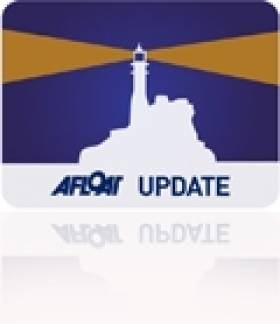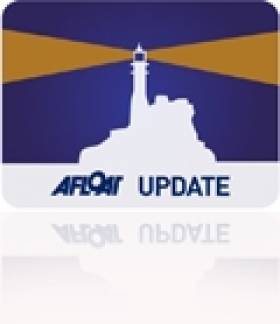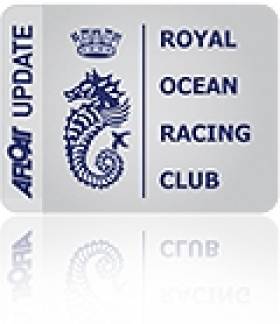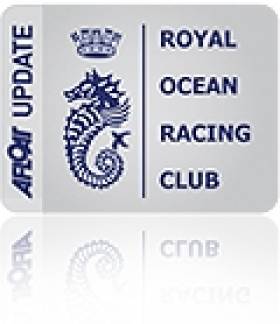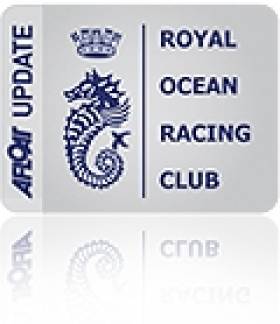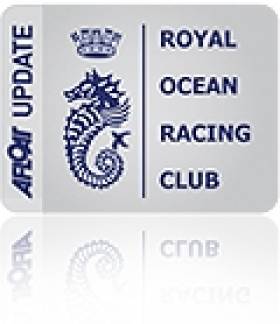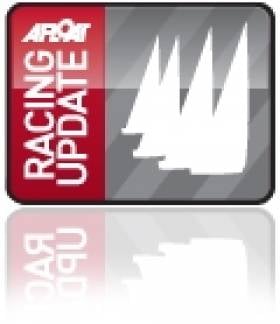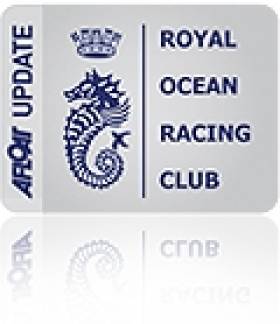Displaying items by tag: RORC
While it might be an exaggeration to say that all of the 21 crew members of Rambler 100 owe their lives to the Irish Search and Rescue service, there are certainly five people whose future prospects were greatly improved by the operation off the Fastnet Rock on August 15th. A lot of media focus has been on Coxswain Kieran Cotter and the crew of Baltimore Lifeboat as well as lifeboat mechanic Jerry Smith, whose dive boat, on charter to the media team of one of the competitors, was on hand to search and recover the five drifting crew. There is no question that this focus is appropriate. RNLI crews all over the UK and Ireland deserve the attention, not only because of their extraordinary voluntary dedication to the cause, but also because such publicity helps swell the coffers of the charity. The service could not operate without the generosity of the donors and incidents such as these help fill the blue boat-shaped boxes held by even more RNLI volunteers.
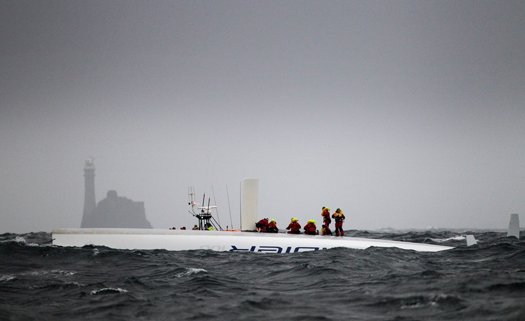
Saved: Ireland's Rescue Services Answered the Call of the capsized Supermaxi Rambler 100 off the Fastnet Rock. Photo: Team Phaedo
The dramatic stories and pictures dominating the media show the front line of a quite wonderful resource that is Search and Rescue in Ireland today. Baltimore Lifeboat was at the coal face of an intricate network of operations, triggered by the crew's EPIRBs. Irish Coast Guard radio officers in Valentia responded almost immediately tasking the rescue resources, working the phones and computers to confirm that this was not an accidentally triggered EPIRB, contacting RORC HQ, determining search patterns and relaying the information to the scene. It was the backroom contacts between RORC and the Coast Guard in endeavouring to contact Rambler 100 using satellite phones that confirmed the possibility of a catastrophic incident involving the Supermaxi. The subsequent tasking of the Shannon and Waterford based Sikorsky helicopters led to the medevac of crew member Wendy Touton and timely treatment of her hypothermic condition, initially by the on-board paramedics and later at Tralee General hospital. And Coast Guard involvement didn't end with the successful rescue – the shoreside operation to provide food and shelter in Baltimore was coordinated by Coast Guard personnel and the salvage operation of the hull of Rambler 100 was overseen by the Irish Coast Guard.
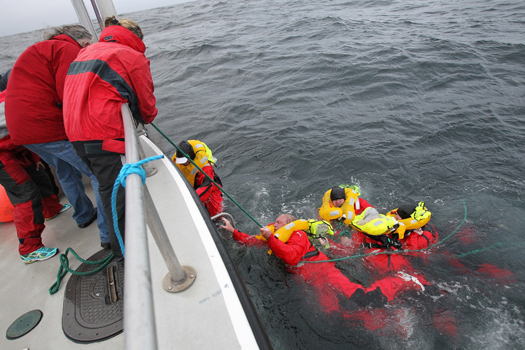
Rambler crew are recovered from the water after a SAR operation by the Irish Coastguard Photo: Team Phaedo. More photos here.
That Ireland has probably one of the best Search and Rescue services in the world goes back to the campaign initiated in 1988 by Joan McGinley, following the death, within sight of land of Donegal fisherman John Oglesby, whose leg was severed in a trawl winch. Eamon Doherty, the late former Garda Commissioner chaired the review group established in response to the campaign and his report led to the establishment of the Irish Marine Emergency Service, subsequently the Irish Coast Guard. Under the guidance of Director Capt Liam Kirwan, the new service moved quickly to become not only the central co-ordinating body for Search and Rescue, but developed its own resources, notably the helicopters, previously tasked in from Irish Air Corps and UK SAR.
Another element that will feature in the Rambler 100 incident is the Marine Casualty Investigation Board (MCIB), set up from recommendations arising from a review of the handling of investigations into marine casualties.
It might be thought that the incident is now closed, but there are many unanswered questions and the investigation will be looking at these and making recommendations that should improve safety in this sector. These questions will include EPIRB performance, liferaft deployment and grab bag usage, but perhaps the key issue yet to be determined is why the response from fellow competitors didn't appear to happen. Even if Channel 16 wasn't being actively monitored, and if not why not, shouldn't the Mayday set off by the Coast Guard have set off the DSC alerts on the radios of Rambler 100's fellow competitors? Had the incident occurred several hours later or earlier when Rambler 100 could have been up to 100 miles from the nearest land, when conditions worsened, we could be looking at much more serious consequences.
It is heartening to think that, in this small country of ours in troubled times, not only do we have a shining star in our search, rescue, recovery and restore system, involving professionals and volunteers cooperating for the greater good, we also have a system that determines the nature of incidents so that we can all learn from the experience.
And let us not forget those people and services, such as the Gardai, Navy, Army and the community of Baltimore who are outside the media spotlight who contributed to this happy ending.
Afloat's Latest Coastguard News
Afloat's Latest RNLI Lifeboat News
Afloat's Latest MCIB News
Having led for the majority of the race, there was a deserved win for Tanguy de Lamotte aboard his Rogers-designed Initiatives - Alex Olivier (FRA), which arrived two and a half minutes ahead of the new Kiwi 40 Peraspera (ITA), in turn just 30 seconds in front of Red (GER), skippered by Mathias Mueller von Blumencron, former Editor in Chief of Der Spiegel magazine.
Having led for most of the race, Initiatives - Alex Olivier was overtaken by Peraspera at the last headland coming into Plymouth and it was only because their last tack into the finish took them further south of the Plymouth breakwater, that they won. "We could go on one tack to the finish line and that is where we pulled away and overtook them again," recounted de Lamotte. "It was a literally a few hundred metres before the finish line. So it could have gone any way, anyone could have won it."
Finishing 3 hours and 13 minutes astern of the Class 40 leader and 12th in Class 40 was the Class 40 Dragon (USA), skippered by Michael Hennessy, who recently sailed his boat in the Transatlantic Race 2011. "It is pretty exciting stuff," said Hennessy of the close finish. "We had a tough race. It is challenging because no one on the boat knows English waters at all and local knowledge played a big part from Bishop Rock on. We had a couple of lead changes after that and the last one went against us."
Hennessy is a regular competitor in the US-equivalent of the Rolex Fastnet Race, the Newport Bermuda Race. "That is great, but this is far more tactically challenging. You break it down and there are eight segments to this race and each has its own unique challenge to it. This was a really tactically challenging race and far more competitive than I had anticipated. It is the best race I have ever done."
Overnight the leaders in IRC 1 arrived in Plymouth, welcomed this morning by a prolonged and torrential rain. At present, French boats are looking to be the strongest contenders on handicap with the familiar Grand Soleil 54 Codiam (FRA) of Nicolas Loday and Jean Claude Nicoleau ahead of the Laurent Gouy's Ker 39, Inis Mor (FRA).
Inis Mor skipper Laurent Goyh said, "It was good. Going out of the Solent was fast and quick, but it was hard getting to the Fastnet (rock)." Goyh, whose last Fastnet Race was in 1997 aboard a Grand Mistral one-design maxi, said he felt they had sailed an extremely good race, despite running out of wind for 30 minutes at Bishop Rock, and was frustrated that their result wasn't better.
Peter Rutter's Quokka 8 (GBR), the UK IRC National Champion, arrived in at 07:31:12 this morning in IRC2, the boat on this occasion part of the seven-strong fleet entered by charter company Sailing Logic. Rutter and Sailing Logic's Philippe Falle were sailing Quokka 8 with a youth crew. "We did very well indeed," said Rutter on his arrival. "It was superb racing, as always with the Fastnet. It was quite a rough second night. After Bishop Rock we watched the whole fleet sailing up to us, we stopped and we managed to get slightly inshore of the rest of the fleet and then got 4 miles ahead in the space of about 1.5 hours, which was pleasing."
Just ahead of them on the water but sailing in IRC 1, was the Scheveningen-based Swan 42 Baraka Gp (NED) skippered by Piet de Graaf and sailed by a crew comprising many family members. "I think we sailed pretty well, especially in the first part of the race," said elder son Dirk de Graaf. "We worked well and our navigator and tactician did good preparation. We were off Land's End in a good position. In the Irish Sea we had some tough conditions and we saw 30 knots."
The Swan 42 is not known for being an offshore boat and it was the boat and the crew's first Rolex Fastnet Race. However the team had prepared extensively including competing in the North Sea Race earlier this year, along with some other qualifiers. "We have sailed some offshore (races) before, but not as big as this one. This is the best race I have ever done," concluded Dirk de Graaf.
At present the weather is being dominated by the Azores high bringing northerly winds across the race course. Over the next 24 hours the high pressure is expected to turn more into a ridge, and by tomorrow morning this will be on an NE-SW axis straight across the middle of the race track, with precious little wind in its vicinity through until Saturday, making for a slow finish for the tailenders.
As of 1200 BST today, 82 boats have finished the race; approximately 200 were still racing, and 32 have retired.
Tail Back in the Fastnet Race
Since yesterday afternoon there have been just been five finishers: the last two IMOCA 60s completed the course with Alex Thomson's Hugo Boss reaching the line at 22:10:01 BST yesterday, while DCNS 1000 arrived at 00:22:22, skippered by round the world sailor Marc Thiercelin who was racing on board with Luc Alphand, the 1997 World Cup winning skier, who in 2006 also came first in the Paris-Dakar rally.
Between the IMOCA 60s, the Oakcliff All American Offshore Team entry on the STP65 Vanquish crossed the finish line at 00:19:35, while Lloyd Thornburg's orange-hulled Gunboat 66 catamaran Phaedo pulled into Plymouth's Sutton Harbour after arriving at 03:03:24.
Phaedo's captain Paul Hand, from Tasmania, commented: "The most exciting part was the hull flying out off the Needles and the more anxious moments were during the beam reach up to the Rock in 35 knots of breeze, with 20 knots of boat speed and one hull in the air. No one was sleeping that much then..."
Hired guns, navigator Ian Moore and tactician Andy Beadsworth, were crucial in Phaedo reaching Plymouth so quickly, getting the most benefit from the tide and smallest wind shifts. Nonetheless, just short of the finish line their progress was slowed as they had to wait for the tide to turn.
The Phaedo team also played a vital role in the rescue of the Rambler 100 crew, as off southwest Ireland it was their media boat which picked up the five crew, including skipper George David, after they had been in the water for 2.5 hours, having drifted away from their capsized supermaxi.
The only arrival since dawn this morning has been Franck Noel's TP52 Near Miss from Switzerland which crossed the line at 10:46:05 BST. Skipper, French match racer and offshore sailor, Benoit Briand was pleased to have finished. "Last night we were stuck off the Lizard with tide and no wind. We spent four hours in a circle of one mile!"
Like the boats that finished yesterday, Near Miss' timing around the Fastnet Rock went well, coinciding with a wind shift from the southwest to northwest. Briand said the most wind they saw was 25-29 knots, on the approach to the Rock. "The wind was okay, but the waves were 'enough' for the boat." The conditions abated for them last night as they rounded the Scilly Isles.
Unfortunately they lost their main competition, Johnny Vincent's TP52 Pace, after she retired on the first night. Subsequently, they spent most of the race sailing on their own.
"We were very happy to sail this legendary race," Briand summarised. "For us it was a challenge. Our TP52 is not made for offshore racing and we are very happy with the way we were sailing. We come back without damage, we had a very good time, and we sailed well. The boat is in good shape and we very much enjoyed this race."
Another boat that reached Sutton Harbour yesterday was RORC Commodore Andrew McIrvine's First 40 La Reponse, which retired overnight on Monday with steering trouble.
"We were charging along about one-third of the way up the Celtic Sea with gradually increasing breeze, gusting 30 knots and quite big waves and we were down to a jib top and a reefed main, going really well," recounted McIrvine. "I was sitting on the rail and the next thing I knew the boat had tacked and I was half under water. The wheel had just gone loose and wasn't connecting with the steering at all." They managed to deploy their emergency steering, but sadly their race was over.
This morning, several of the boats rounding the Scilly Isles were more or less becalmed. Jonathan Goring, owner of the Ker 40 Keronimo reported that there was a band of very little wind around 10-20 miles from this group of islands off the southwestern end of Britain. They had just managed to keep moving in the light patch with the German-flagged Rogers 46s Shakti and Varuna and had been first into the new breeze.
Similarly, the crew of the Ross Applebey's Oyster 48 Scarlet Oyster were becalmed on their approach to the Scilly Isles, although Applebey said the reprieve had come when a light easterly had filled in. "We hope the wind holds until the finish - that is what the GRIB files have suggested. But, we've had consistently less wind than forecast all day today, so it is hard to tell. It would be nice if we don't park up again, as kedging a mile from the finish line could be a bit stressful!"
The next boats due in are the Lithuanian Volvo Ocean 60 Ambersail and Chris Bull's canting keel Cookson 50 Jazz, both of which had just passed the Lizard mid-afternoon today. Meanwhile the remaining slower Class Z boats are still approaching the Lizard with on-the-water leaders in IRC 1, which are currently include the trio of the Ker 40 Keronimo, the Andrews 56 Norddeutsche Vermögen Hamburg and the Swan 62 Uxorious IV, all more or less neck and neck. On the water leaders in IRC 2, Quokka 8 and the French J/122, Nutmeg IV were making slow progress to the south of the Scilly Isles.
Rambler 100 Capsize - 'A Scary Moment We Will Not Forget'
At midnight, Monday 15 August, Eddie Warden Owen, Chief Executive of the Royal Ocean Racing Club received a call from Mick Harvey, Project Manager of George David's Rambler 100 (USA). Harvey spoke about the harrowing incident when the 100' Maxi Rambler 100 capsized in the Celtic Sea during the Rolex Fastnet Race.

The incident happened just after Rambler 100 rounded the Fastnet Rock at 17:25 BST. At the time, Rambler 100 were leading the monohull fleet and vying for monohull line honours in the Rolex Fastnet Race which started on Sunday 14th.
Mick Harvey's account of the incident was charged with emotion. The tough Australian, who now lives in Newport, Rhode Island (USA), is a seasoned veteran, but he was understandably shaken by the incident:
"Soon after rounding the Fastnet Rock, the wind went southwest, right on the nose. We were beating into big seas, launching Rambler off the top of full size waves. I was down below with navigator, Peter Isler when we heard the sickening sound of the keel breaking off. It was instantaneous; there was no time to react. The boat turned turtle, just like a dinghy capsizing. Peter Isler issued a Mayday and we got out of there as quickly as we could."
The EPIRB had been activated and a number of crew climbed over the guardrails and onto the hull as the boat capsized and helped those swimming to safety. The Atlantic swell made it difficult for the crew to get out of the water however, working together, 16 of the crew managed to scale the upturned hull.
Five of the crew were swept away by the waves out of reach of the stricken Maxi and these included Skipper, George David and partner Wendy Touton who were in the water for two and a half hours. This group linked arms, forming a circle. Valencia Coastguard diverted a local fishing boat, Wave Chieftain to assist, which winched the crew on board. Earlier a helicopter had been scrambled from Shannon Airport helicopter, Wendy Touton was airlifted for medical attention due to the effects of hypothermia and the four remaining crew were taken to Baltimore Harbour where they were re-united with the 16 crew rescued by the Baltimore Lifeboat.
"It was a scary moment. One that I will never forget," admitted Mick Harvey. "I can't begin to tell you how relieved I am that all of the crew are safe. The town of Baltimore has given us a wonderful welcome. I can not thank our rescuers and the people of this lovely village enough. Wendy is in Kerry Hospital and doing fine, I am just so relieved that everybody is okay."
Fickle Winds Prevail for RORC Channel Race
The leg to St Catherine's was painful and as the new breeze filled in from the South West it was those who were offshore that benefitted. There were several retirements but those that stuck it out were rewarded with some excellent sailing in a moderate breeze once they got to Bembridge Ledge.
The shy reach east to Saltdean Light Buoy (off Brighton) favoured the yachts carrying asymmetric spinnakers and by the time the fleet finished back in the Solent it was a glorious day with fair winds for a wonderful finale to the race.
David Aisher's J/109, Yeoman of Wight, crewed by the British Keelboat Academy were the overall winners in a large fleet taking the Channel Challenge Cup.
Yeoman of Wight's skipper, Henry Smith described the important factors in their win. "We got through Hurst in good shape. Leading our class, because we decided to go to the main land shore, which worked very well for us. Like the rest of the fleet, when the wind died we ended up kedging at Bridge.
However for most of the race we had a spinnaker up and we were very meticulous about our watch system, making sure that we all stayed as fresh as possible, especially alternating trimmers and minimising disruption during hand overs by talking through the conditions as new crew came up on deck. We approached Saltdean Light Buoy with favourable tide and as we went around the tide turned in our favour and we knew we were in with a chance. It was a great team effort and we are absolutely delighted with our win."
" I am very proud of their achievement" commented David Aisher. "The average age of the team is just twenty one, and this is a great boost to their confidence before the Rolex Fastnet Race, which is just a few weeks away."
In IRC Zero, Johnny Vincent's TP 52, Pace, scored a notable victory over IRC Zero RORC Season's Points Leader Venomous, skippered by Derek Saunders and Andres Soriano's Mills 68, Alegre.
In IRC One, Mark Devereux's Swan 42, Brevity, claimed their first class win of the season beating the current RORC Season's Points Championship leader Piet Vroon's Tonnerre de Breskens. Jonathan Goring's Ker 40, Keronimo, was third in class.
IRC Two produced a titanic battle between two J/122s, Neil Kipling's Joopster, and Alain Catherineau's Lorelei. Joopster won class by just under three minutes on corrected time. Quokka 8, sailed by Sailing Logic, took line honours for the class and was just five minutes short of eclipsing the winner after time correction.
IRC Three was won by Yeoman of Wight, second was Tor McLaren's J/109, Inspara, with Peter Olden's A 35, Solan Goose of Hamble, third.
IRC Four saw a clean sweep of podium places for French yachts. Nicolas de la Fourniere's X-34, Exile/Mirabaud, was first in both IRC Four and the Two-Handed Class. Frederic Waniart's Aphrodite 101, Vim, and Pierre Viard's Prism 28, Adrenaline, were second and third in IRC Four, respectively.
"What a difference a day makes" commented RORC Racing Manager, Ian Loffhagen. "Before the start drizzle and the fickle wind was not conducive to great racing but as forecast the breeze did fill in and those yachts that stuck it out enjoyed a great race in some beautiful conditions. The race took most of the yachts about 24 hours as planned and more importantly, fulfilled several yachts ambitions of completing the necessary qualifying miles for the Rolex Fastnet Race. I am sure that the competitors and also all of us at the RORC are now fully focused on the highlight of the season."
The Rolex Fastnet Race starts on August 14th, competitors are advised that decals, trackers and Sailing Instructions are now available from the RORC Office in Cowes, however these will only be issued to yachts that have completed all of the entry requirements.
RORC Channel Race Preview
This Saturday morning sees the start of the last RORC offshore race prior to the Rolex Fastnet Race in August. It is the last RORC race for competitors to tune themselves, their equipment and their yachts prior to this year's big event. However, this is more than just a dress rehearsal. The Channel Challenge Cup is the overall prize as are vital points scored for the RORC Season's Points Championship. Even at this late stage in the series, many classes still hang very much in the balance. It could be a tricky weekend with light airs racing a very high probability.
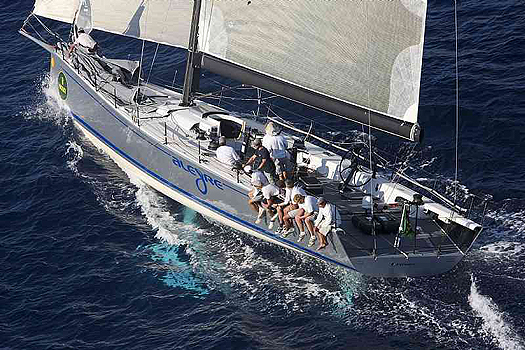
In IRC Zero, Derek Saunders' CM 60, Venomous, was the class winner for the Channel Race last year and a good result this weekend should see the team move to first in class for this season. However, Venomous has some highly accomplished opposition. Andres Soriano's Mills 68, Alegre, and Johnny Vincent's TP52, Pace, have been campaigning at prestigious events in the Mediterranean all year and will be very much up to speed. Jens Kuehne's RP 48, Sjambok, may well enjoy being the lowest rated boat in the class. Alex Thompson's IMOCA 60, Hugo Boss, is joining the big boat class and will also be racing in the Two-Handed Class.
IRC One has fourteen yachts entered, including the current top four yachts in this class for the championship. Piet Vroon's Ker 46, Tonnerre de Breskens, will be hoping that their recent mainsail re-design will go well in the light and Jonathan Goring's Ker 40, Keronimo, is also yet to be race tested in gentle breeze. Chaz Ivill's Grand Soleil 54, John B, won its class in last year's race and won't be giving up without a fight. The predicted light weather may not suit the three Farr 65s entered by Ondeck but it is a welcome sight to have the yachts returning to RORC Racing after competing in this year's RORC Caribbean 600.
In IRC Two RORC Commodore Andrew McIrvine's First 40, La Réponse, is the current class leader and also won last year's Channel Race Overall. "I was delighted to see that 98 yachts had entered for the Channel Race, especially as like me, many of the competitors have so many other commitments away from sailing. Many of the yachts entered will be looking for a final shakedown before the Rolex Fastnet Race and as we have had a very windy season of racing, I think that it is very useful to race in what looks like light conditions. This should give all of us practice in a mode of racing that we have hardly experienced at all this season."
Two yachts vying for the IRC Two title may well be looking forward to a light airs race. Niall Dowling's J/111, Arabella, competes for the eighth time this season and currently lies second in class for the championship. Neil Kipling's J/122, Joopster, is fourth but should move up to third with a decent result this weekend. Both of these designs are light displacement with a sail configuration that may well enjoy the predicted weather.
Peter Rutter's Quokka 8 had a magnificent run in this month's IRC National Championship, taking a clean sweep of eight bullets. For the Channel Race the Grand Soleil 43 will be skippered by Philippe Falle and sailed by Sailing Logic. The yacht racing school has no less than five yachts racing including Visit Malta Puma, skippered by Tim Thubron which is currently third overall for the season.
Twenty two yachts are entered for IRC Three including current class leader Nick Martin's J/105, Diablo - J. Peter Olden's A 35, Solan Goose of Hamble, will be looking for a good result to move up from third overall and also to defend last year's class win in the Channel Race. Both of these yachts are very much in contention for the Two-Handed title. Last year's Channel Race saw just three teams sailing short handed, this increasingly popular discipline has attracted 22 yachts for the 2011 RORC Channel Race
The largest class racing this weekend is IRC Four with 28 yachts set to race. The class leader for the season is Matthias Kracht's JPK 9.60, Ultreia!, which also leads the Two-handed Class. Ultreia! has a commanding lead for the season. IRC Four is producing some extremely close racing and probably the most competitive division racing with RORC this season; the top ten yachts are all still capable of winning the class.
In sharp contrast to a season of high wind speed and adrenalin pumping sailing this weekend's RORC Channel Race could be a very different affair. However for many crews, light air spinnakers and headsails may not have seen too much UV light this season. The Channel Race is a golden opportunity for teams to excel at a different point in the yacht racing spectrum. To achieve the result that is hoped for, concentration levels will need to be as high as possible.
Closing Date for competitors in the 2011 RORC Channel Race was Thursday, 21st July. Late entries are possible until Friday, 29th July.
Antix Finishes Second at British IRC Championships
Royal Cork's Antix skippered by Anthony O'Leary has finished as runner up in the IRC 1 division at a heavy weather staging of the British IRC Championships this afternoon.
With eight bullets in eight races, Peter Rutter and the crew of the Grand Soleil 43, Quokka 8, comfortably secured the 2011 IRC National Championship title as well as victory within IRC 2.
"I am incredibly proud - my crew have really worked their hearts off," said Rutter. "I have never been able to win this regatta before and I said to them 'we have to nail it this time' and they have worked their cotton socks off. So I am very very pleased and it is nice to have got this one finally put away. The boat is going well, the sails are good and the crew work has been stunning."
Matters were made no easier for the crew after Quokka 8's skipper unwisely chose light and moderate weather kites for this regatta, which has typically seen the wind rarely drop below 20 knots. Rutter paid his respects to the RORC race committee for laying on a good series, also admitted that being one of the fastest boats in Class 2 also helped. "It was the place to be, in winds of this strength - it helped you get clear wind. But keeping the boat under the rig was the important thing in this regatta!"
One of the favourites in IRC1, Jonathan Goring's new Ker 40, Keronimo, put this to the test today when on the final run of the second and final race, she was nailed by a squall, causing her to re-enact the famous pitchpole of Silk II (as captured on camera by Beken of Cowes). Tactician Simon Shaw recounted what occurred: "A big black cloud was chasing us down the run and we'd just changed on to the no4 and gybed to come into the mark when the front of the gust hit and the wind went from 26 to pretty much 40 knots...
"The boat instantly jumped into the wave we were following. The rudder was fully out of the water. It was a bit like watching one of those Extreme 40 capsizes - you are on top of the world looking down at the boat, holding on to the runners with your legs dangling down into the cockpit going 'hang on I thought this only happened on catamarans!'"
Keronimo teetered in her pitchpoled position for what seemed like 10 seconds, her bow buried so deeply into the water that the instrument displays on her mast were submerged, until eventually the fitting at the end of her bowsprit exploded and the chute roared aft destroying all the stanchions along her starboard side. "We lost one guy off each side and one off the bow," continued Shaw. "So we scooped everyone back in, wrestled the chute down over the back, pulled the jib up, bore away and carried on with the race." Thankfully no one was hurt in the incident.
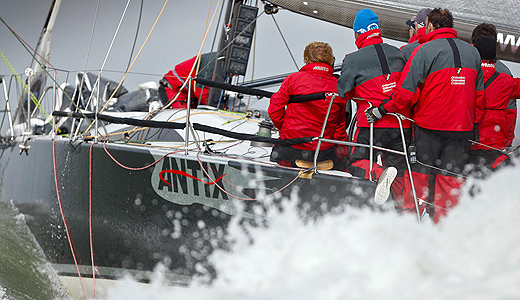
Royal Cork's Antix finished second in Cowes this afternoon. Photo: Paul Wyeth
Victory in the hard fought IRC 1 was deservedly scooped up by the winner of both today's two races, Piet Vroon's Ker 46 Tonnerre de Breskens 3, also winner of the Jackdaw Trophy for coming second overall under IRC. Anthony O'Leary's Antix finished just a point adrift in second in IRC 1, ahead of third placed Keronimo.
Another equally unusual incident occurred prior to the start of today's first race on board Peter Morton's MAT 1010, one of the contenders in IRC 3, when her port cabintop window imploded. The exact reasons for this remain a mystery. but Morton believes the window was weakened by a barber hauler block repeatedly rapping against it and broken terminally when the weight of one of the crew was applied to it. In the brisk conditions they were forced to retire.
In IRC3 today's winner, claiming both races, was Michael Brough's Bavaria Match 38 Steady Barker, but even this fine show left them three points adrift of Mike Bridges' Elan 37, Elaine, the class victor.
Brough, who has been toughing it out since he twisted his knee during racing yesterday, says Steady Barker enjoys light or heavy airs and in this regatta they have seen more than their fair share of the latter.
Their racing today was also not without incident. "Before the start of the second race our mainsail ripped luff to leech," said Brough. "We just got it down, put some duck tape over it and it managed to make it all the way." Fortunately when the squall hit on the last race they were sailing upwind and the most they saw was 32 knots. Even so they decided to play it safe on the final run and chose not to hoist the kite. "We thought we'd see if anyone blinked before we put the kite up," admitted Brough. "Fatjax tried it and went over on her side. Even so we were doing 10.5-11 knots without the kite."
IRC 4 saw Adam Gosling's Corby 30 Yes! claim two bullets to win their class overall, albeit just three points ahead of Michael Kershaw's Half Tonner, Chimp.
Generally of this RORC IRC Nationals Brough observed: "The races have been great. Everyone is absolutely shattered on the boat, including the bowman. It has been hard racing and I'm glad RORC stuck with it rather than just canning it."
With a slow moving front passing across the Solent today, the fleet competing at the RORC's IRC Nationals were subjected to one of the windiest days they have seen so far this season.
Three races were held on the central Solent and with the wind gusting into the 30s for today's final encounter, there were a multitude of DNSes and DNFes. While there were at least two dismastings on the Solent, fortunately the carnage in the IRC Nationals fleet was limited principally to sails and fittings, while those that did last the course were to be commended for their prudence, the majority for example choosing not to hoist the kites in the blustery final race.
Former Volvo Ocean Race skipper Bouwe Bekking, competing on board Willem Wester's Grand Soleil 46, Antilope, in IRC 1, said the most wind they saw was 32 knots. "That's fun and it is good that they keep us racing in that, because it brings seamanship back to everyone." Bekking said that they continued to use their spinnaker today but the lighter weight asymmetric boats, able to hoist large genoas on the reaches, were able to sail four or five knots faster than they were. For the most part today Antilope came away unscathed, although they suffered a small rip in their mainsail.
Antilope was one of only five boats in IRC 1 to complete the final race. Crucially one of the DNFs was Jonathan Goring's overnight leader, Keronimo, so the lead in the highly competitive IRC 1 has now passed to Anthony O'Leary and his Irish Rolex Commodores' Cup winning crew aboard the Ker 39, Antix.
Of course loving today's brisk conditions was Dutch salty seadog Piet Vroon, skipper of Tonnerre de Breskens 3, who's 3-1-1 scoreline was the most consistent of the day. His blue hulled Ker 46 now holds second place in IRC 1 two points astern of Antix and two ahead of Keronimo.
This is not the first time the well-travelled Tonnerre has encountered such conditions. "The boat goes better with a lot of wind," admitted Vroon. "And yes, we have seen these conditions occasionally. The boat did everything that was expected. Whether the crew did or not...!"
With more breeze forecast for tomorrow, Tonnerre could be in with a good chance of repeating her IRC Nationals class victory from two years ago, when she was just four weeks old.
While Johnny Vincent's modified TP52, Pace, continued her unbroken string of wins in IRC 0 against Rob Grey and Sam Laidlaw's Farr 52, Bob, both choosing to stand down from today's final race, so in IRC 2 Peter Rutter's Grand Soleil 43, Quokka 8, now has scored a phenomenal six bullets in as many races. Fighting for the remaining podium positions going into tomorrow's final two races are Nicolas Gaumont-Prat's First 40.7, Tradition Philosophie IV, Jim Macgregor's Elan 410, Premier Flair, and Richard Fildes' Corby 37 Impetuous.
Unfortunately in today's second race Jim Macgregor's Premier Flair suffered a contretemps with Peter Morton's MAT1010 sailing in IRC3. Morton recounted the incident: "They went around the top mark, hoisted and did a massive roll to windward - they almost did a Chinese gybe on top of us! We were on port and they were on starboard, but we were a long way away but they did this huge roll to weather and hit the top of the rig."
MAT1010 retired from that race but bounced back to win today's breezy third. In one gust Morton said they had seen 34 knots and at one point when they had the kite up they clocked 19 knots - not bad for a 33 footer.
With Chris and Hannah Neve's No Chance disqualified from yesterday's second race due to a start line infringement that ended up in the protest room, followed by an OCS in today's second race, so the leader in IRC 3 is now Mike Bridges' Elan 37, Elaine.
"We were just trying to keep it safe today," admitted Bridges, so says that for this regatta they are sailing with a mixed crew and don't have their usual amount of hiking weight on the rail. "We just wanted to get around and stay close to people."
Bridges says that Elaine likes "anything between 12 and 20+ knots, but 30 is probably a bit much!" Today they managed to avoid too much carnage although the conditions did take their toll and they blew out a fitting for the vang. "We had to replace that on the way. Otherwise there was nothing major," said Bridges.
In IRC 4 Adam Gosling's Corby 30, Yes! has been propelled into the lead following bullets in today's final two races, while yesterday's leader Michael Kershaw's Half Tonner, Chimp, was one of four boats in the class to bow out of today's final race, dropping her to second.
A final two races are scheduled for tomorrow and at the forecast at present is showing at least as much wind as we have seen today
Racing Round up: Dun Laoghaire Regatta, ISAF Youths, Optimists, Paralympic, RORC, WIORA, Quarter Ton, Kiteboarding.
In offshore news, the Transatlantic Race 2011 Nears a Finish, and RORC yachts that headed West did best in the St Malo from Cowes race. Ireland's entry in the Tall Ships race, Celtic Mist, is safely in Scotland. WIORA starts this week in Clifden, thirty boats are expected.
Two top Cork performers are in Cowes for this week's Quarter Ton Cup.
In other boating news, rower Siobhan McCrohan won bronze at the World Rowing Champs in Lucerne, Kiteboarding debuted in Dun Laoghaire. There were Medals for Irish Kayakers at Athens Special Olympics.
And finally after a Elaine 'Shooter' Alexander is set for hero's welcome this week as she becomes the first woman from Northern Ireland to circumnavigate the island of Ireland.
All on our home page this morning, thanks for your interest in Irish Sailing and Boating.
Going West Paid for RORC Yachts
The 164-mile race to St Malo from Cowes is one of the most popular races in the RORC Season's Points Championship and this year 177 yachts entered the race. It was a spectacular start from the Squadron Line. The impressive RORC fleet got off to a flying start reaching across the line in an awesome display of power. The Race Committee elected to start the fleet to the East to avoid sending the fleet through Hurst Narrows where 30 knots of wind over tide and congestion may well have proved hazardous for the racing yachts. The wind persisted in direction and strength as the fleet sailed down the Eastern Solent to turn to the west and out into the English Channel.
"The wind was forecast to abate and veer to the West, which it did and those yachts that went West made big gains" commented RORC Racing Manager Ian Loffhagen. "The tricky decision was how far West to go and those that got their tactics right held the advantage. The breeze dropped as it veered but the wind held for most of the fleet until they got to Jersey. However, the faster boats had breeze all the way into the finish, this year, the conditions definitely favoured the faster boats."
Colin Buffin's Swan 62, Uxorious IV, was the overall winner of the race winning the prestigious Edward VII Cup. Uxorious IV was unable to come into St Malo as they had to get to Cowes the following day to register for the Swan European Regatta. Colin Buffin was amazed to find out that the team had won such a major race.
"We had no idea we had won such a marvellous trophy" exclaimed Colin Buffin. "The start was electric, with a jib top and a staysail, the boat really lit up but we couldn't match Tonnerre for speed, however we managed to hold our own as we went down the back of the island. Brett Aarons was navigating and he was spot on with the tactics and we came out in the morning ahead of Tonnerre. However, at the end they passed us using their code zero to good effect but we managed to win on handicap. We have only recently started racing the Swan 62 and I am absolutely delighted with the performance, she handled the heavy weather without any problems at all and now we are really looking forward to the Swan European Championship next week."
There was another good battle in IRC Zero, Franck Noel's Swiss TP52, Near Miss, took line honours and the class on handicap from Dutch skipper, Harm Prins' Volvo 60, Pleomax. The Volvo 60 got away well but the lighter TP52 came back in the lighter air to pass them in the latter part of the race.
Uxorious IV was the winner of IRC One beating two highly successful yachts. Piet Vroon's Ker 46, Tonnerre de Breskens was second and the Grand Soleil 43 Codiam claimed third.
In IRC Two Peter Rutter's Grand Soleil 43, Quokka 8 raced by Sailing Logic enjoyed their first class win of the season, beating Michel Peritie's French A 40, Stamina III into second place. Nigel Wakefield's First 40, Carpe Diem sailed by Ed Broadway was third in class and will have enjoyed getting the better of all the other First 40s including Iritis and La Réponse.
One of the most impressive performances in the race was in IRC Three. The French A 35, Ame-Hasle won the class by nearly an hour and a half and was also second in IRC overall. Ame-Hasle skipper, Franck-Yves Escoffier was a very happy man, as he spoke just after the prize giving.
"A great result and a fantastic team, many of us have been together for the several of the races around France in the Le Tour Voile and that was the main reason why we did so well in our class. However, as the wind died at the end of the race so did our chances of an overall win."
IRC Three saw the top six places taken by French boats, including Didier Gaudoux's JPK 110, Lann Ael and Francoise Carluer's A 35, Agence Directe, which were second and third respectively.
IRC Four was won emphatically by the JPK 9.60, Whalalla, skippered by Yves Sale. The Cherbourg based team scored a memorable victory over Jean Yves Chateau's Nicholson 33, Iromiguy by over 5 hours on corrected time, Longue Pierre was third in class.
Of the 23 yachts that sailed the race two-handed Nicolas Gourio's IMX 40, Warhorse was the out and out winner. The French team flew around the course and it was over eight hours before another two-handed boat crossed the finish line. Paddy Cronin skipper of HOD 35, Psipsina, was second and RORC Season's Points Class leader in the Two-Handed Class, Matthias Kracht 's JPK 9.60 Ultreia! was third.
The RORC Season's Points Championship continues on 30th July with the Channel Race, starting in Cowes at finishing in The Solent. The Channel Race is the penultimate race before the highlight of the RORC season, The Rolex Fastnet Race, which takes place next month.
For more information visit: www.rorc.org <http://www.rorc.org/>


























